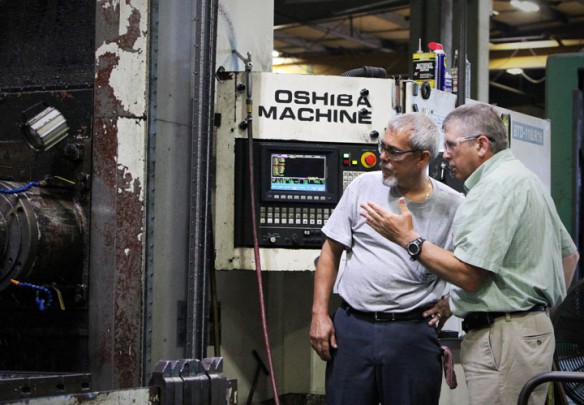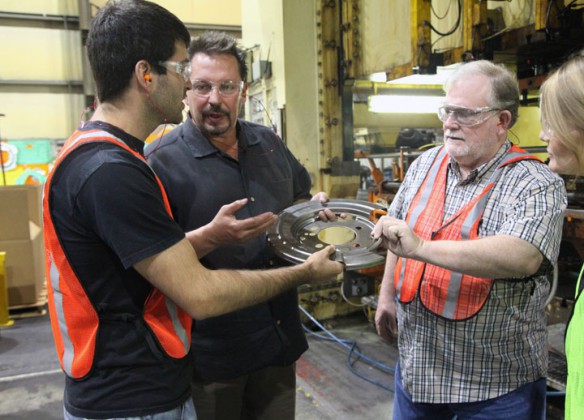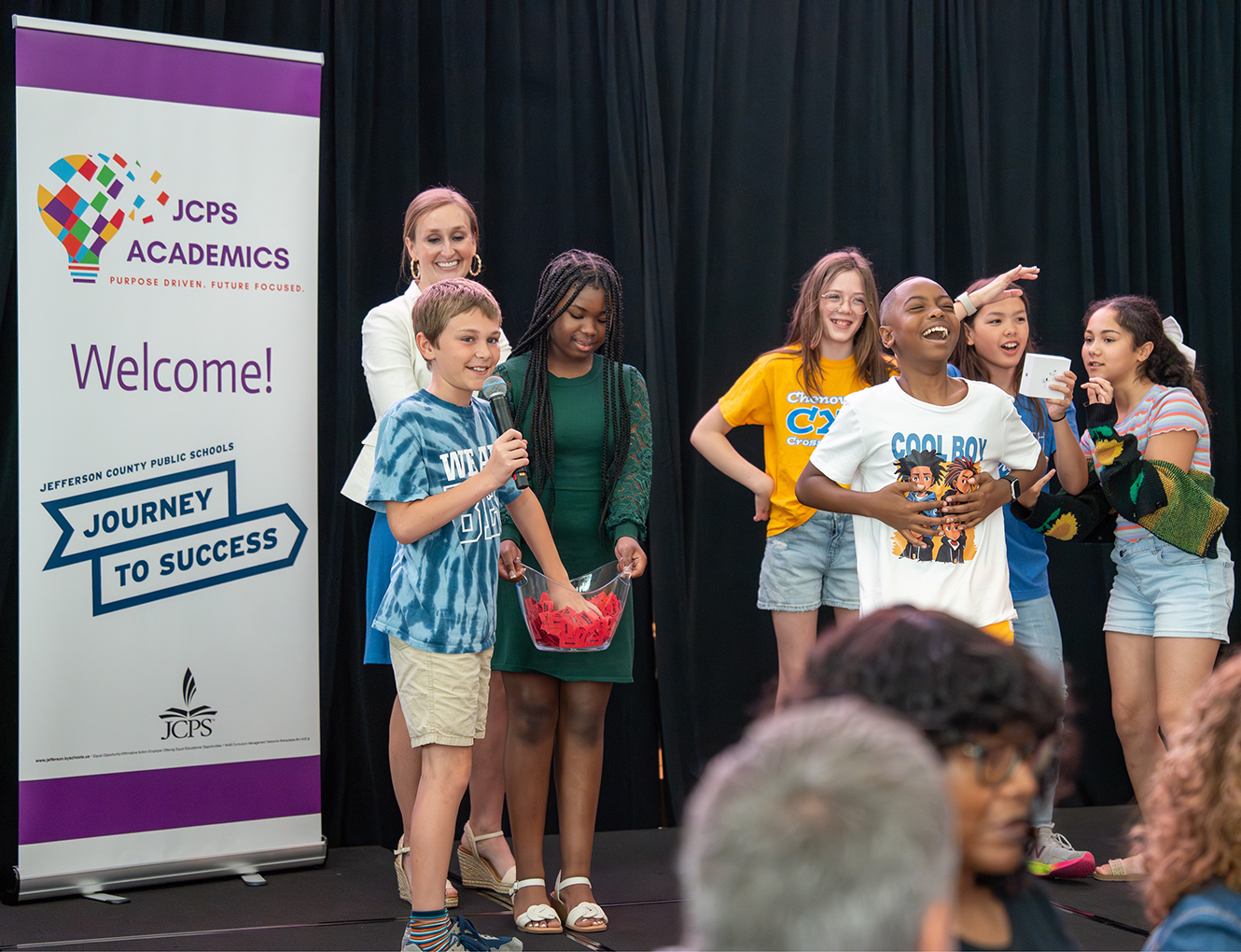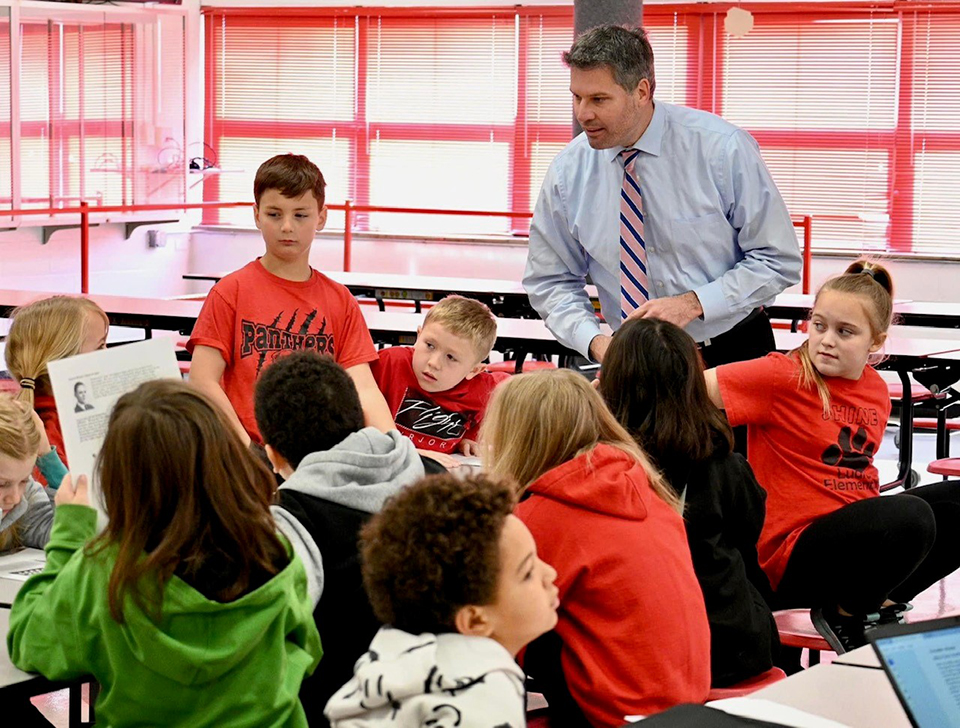
Mark McKinney, left, a mechanical engineer and a pre-calculus teacher at Jeffersontown High School (Jefferson County) discussed the operating procedure of a CNC machine with the machine’s operator at Altas Machine and Supply Inc.
Photo by Tim Thornberry, July 16, 2014
By Tim Thornberry
tim.thornberry@education.ky.gov
The old saying about walking a mile in someone else’s shoes is true in a lot of situations, but teachers in the Jefferson County Public Schools (JCPS) took it to a new level this past summer as several participated in a professional learning program that took them into more than 20 businesses and industries throughout Louisville.
Deborah Anderson, the engineering career theme specialist for JCPS, headed this externship effort to bring the academic and technical training worlds together.
“This training will hopefully give our academic instructors new insight into the Career and Technical side of education,” she said.
JCPS already has a jump on bringing the two education entities together, as most of the high schools serve as magnet facilities for a host of Career and Technical Education (CTE) programs.
Mark McKinney, a mechanical engineer by trade and a pre-calculus teacher at Jeffersontown High School, said that while students who take his class and upper-level math courses don’t necessarily want to become engineers, they need to know how to solve technical problems.
One of the industries teachers visited was Atlas Machine & Supply Inc.
“A lot of the things they do here (at Atlas) require an engineer’s kind of thinking to solve problems,” McKinney said. “We are trying to understand and help the students see project-based learning and learn through something that is project driven.”
Learning from a project-based angle can help students understand math better, and that while a student may be able to understand a problem in the classroom, it is another thing to take that jump and apply it in a setting such as a machine shop, he added.
Jason Stepp, an engineering teacher at Jeffersontown, also made the trip to Atlas. He said bringing the academic and hands-on programs together can help teachers show students how to apply what they have learned in the classroom in a real-world setting.
“There are certain students that can take apart a computer and rebuild it and are using math but they don’t know it,” he said. “I’ve learned a lot here, and it’s something I can take back to the classroom and tell my students this is why you need to know this.”
Jim Kidwell, an engineering teacher, and Adrian Armendariz, a chemistry and physics teacher, teach at the Academy at Shawnee and spent their externships at Louisville’s Nth Works, a precision metal forming business.

Shawnee High School (Jefferson County) teachers Adrien Armandariz, left, and Jim Kidwell, right, talked with Nth Works plant engineer Paul Meshke. Teachers visited the precision metal forming business in an effort to better understand the connection between the classroom and the workplace.
Photo by Tim Thornberry, July 16, 2014
Coming into the project, Armendariz thought he would naturally see a connection to physics, but not necessarily to chemistry, he said.
“Almost instantly, people here were telling us the kind of case problems and studies that involved chemistry, and now I’m thinking how we can use some of those case studies in my classroom to actually incorporate that problem-solving into their work,” he said.
Kidwell said he can teach engineering principles and come up with examples that are real, but not as real as what was done on the job site.
“What has really invigorated me is to see how important it is to work as a team; teamwork and cooperation. Everyone is involved and everyone is vested in creating the final product and problem-solving is huge in doing so,” he said.
Kidwell and Armendariz said this kind of professional learning should happen much more often.
Once teachers see these types of applications, Anderson said, the hope is that they can give students a better understanding of what they should expect in the workplace.
“We piloted this program last summer (2013) with 43 teachers from five high schools and it was overwhelmingly successful in regards to teacher acceptance, saying it was the best professional development they had ever been involved in,” she said.
Anderson added that businesses leaders also love it because they felt a real connection to and a partnership with what goes on in the classroom in helping teachers understand the skills students need.
The program brought 100 teachers into local businesses representing everything from agriculture to welding, Anderson said.
“This is a part of an implementation plan through the Ford Next Generation Learning (NGL) Initiative and is on the books to be the way we do business at the high school level,” she said.
According to Ford, NGL “mobilizes educators, employers, and community leaders to create a new generation of young people who will graduate from high school both college- and career-ready – an emerging workforce prepared to compete successfully in the 21st-century economy.”
James Reddish, vice president for economic and workforce development at Greater Louisville Inc., said plugging the business community into the educational sector has been a big part of implementing the NGL plan for the community. He and Anderson served on a committee that oversaw the implementation of NGL.
“I’ve not met one business leader who said this was not worth their time,” he said. “I think a lot of manufacturers are leading the way in terms of understanding what it’s like to be a teacher in a public school system and see how we can help.”
He added that the business and industry sector should supply teachers opportunities such as these externships because it is the teachers that have to make a connection with the students. “They are our lifelines,” Reddish said.
Anderson said what makes this project work is a connection created between the workforce sector and the education community.
“We live in the hotbed of business and industry here, and fortunately our partners abound. But on top of that, we’ve developed such a relationship that our partners are ready and willing to help us and that can happen in any community no matter what the size,” said Anderson. “It’s about developing relationships. Schools can’t do it alone, businesses can’t do it alone. It is an economic development issue and we’ve got to work together.”
FOR MORE INFO…
Deborah Anderson, Deborah.anderson2@jefferson.kyschools.us



Leave A Comment